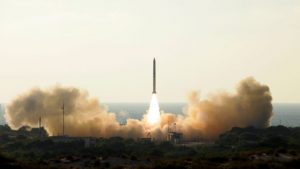
In Part Five of the SpaceWatch Middle East multi-week theme on China’s Space Silk Road and the Middle East, leading Israeli space scholar Dr. Eytan Tepper provides an Israeli perspective. Dr. Tepper points out that while there is a tremendous amount of mutual opportunity between Israel and China on the Space Silk Road, Tel Aviv needs to keep in mind U.S. security interests when considering its role in China’s Space Silk Road.
China’s U.S.$1 trillion Belt and Road Initiative (BRI) to establish a network of roads, railroads, and sea routes and ports is underway, and it has a space segment. Israel has an opportunity to be an important part of the BRI and its space segment, but it does not want to jeopardise its strategic alliance with the U.S., which is suspicious of the BRI. Additionally, there are also concerns emanating from participation of countries hostile to Israel
Israel has much to contribute and gain, and considering the opportunities the BRI and its space segment opens for Israel, it should take an active part in the BRI to the extent that it will not jeopardise its security interests and its strategic alliance with the U.S. Such a path is possible and should be carefully pursued.
The Space Silk Road
The BRI, also known as the One Belt One Road (OBOR), is comprised of two main segments: the Silk Road Economic Belt and the 21st Century Maritime Silk Road. There are two less known segments, the Air Silk Road and a space-based Silk Road – the Space Silk Road. The BRI will connect East and West, facilitate trade, and promote development along the routes. The transportation and development along the routes need space-based navigation, communication, and observation services. This is the purpose of the “Space Information Corridor” that will make use of existing as well as new, special-purpose satellites. [1][2]
The latest white paper on space policy published by the Chinese State Council in December 2016 [3] specifically refers to the BRI. The white paper calls for “strengthening bilateral and multilateral cooperation [in space activities] which is based on common goals and serves the Belt and Road Initiative”. It stipulates the goal of “construction of the Belt and Road Initiative Space Information Corridor, including earth observation, communications and broadcasting, navigation and positioning, and other types of satellite-related development; ground and application system construction; and application product development”. It further specifically sets the target for China’s Beidou navigation system to “to start providing basic services to countries along the Silk Road Economic Belt and 21st-Century Maritime Silk Road in 2018 [and] form a network consisting of 35 satellites for global services by 2020…”.
According to the published plans and statements, we can expect an array of existing and new satellites providing a range of services supporting transportation, communications, and development along the routes. The services will include traffic navigation and control and satellite-based mobile phone services with dedicated satellite smartphones. Further applications will facilitate mitigation of natural disaster, climate change tracking and mitigation, environmental sustainable development, smart agriculture, management of water resources, natural resources discovery, and management and preservation of cultural and natural heritage. We may expect further commercial applications that will provide services to residents, workers, and travelers along the routes and connect them with local service providers.
To accomplish all that there is a need for new satellites, ground stations, compatible receivers and smartphones, and new software and applications. This opens the door for a variety of private initiatives for applications that will provide related services. According to a report by the McKinsey & Company management consulting firm, the BRI will cover about 65% of the world’s population and about a third of global GDP, [4] which renders the economic opportunities too high to be ignored.
Israel’s Potential Contribution and Benefits
There is an opportunity for Israel to be an important player in the Space Silk Road. Israel is already a close trade partner of China, a source of advanced technologies, and a founding member of another of China’s, and President Xi Jinping’s, flagship project – the Asian Infrastructure Investment Bank (AIIB), which is likely to provide part of the finance for the BRI, along with the Silk Road Fund.
Israel, for which high-tech industry is the distinct growth engine that earned it the title “start-up nation”, is also a sophisticated spacefaring nation. Israel joined the exclusive club of spacefaring nations in 1988 and has demonstrated capabilities and products in space infrastructure, products, and services, including leading optical equipment and small satellites. Israel has the eighth largest share of global space services. Furthermore, in 2012 Israel adopted a new Civil Space Policy with plans to boost its civil space industry and place it amongst the top 5 leading nations, making commercial space the next growth engine for the Israeli economy [5].
Potentially, Israel could provide communications and observation satellites, ground segments, receivers, software and applications that are already part of its existing supply. Israel’s bustling app industry can produce new, dedicated apps that will use and support the utility of the satellites serving the BRI.
The white paper on the development of China’s Beidou Navigation Satellite System published in June 2016 [6] states that “China will jointly build satellite navigation augmentation systems with relevant nations, provide highly accurate satellite navigation, positioning and timing services, improve the overseas [Beidou] service performances, and promote international applications of navigation technologies.” Israeli companies like Gilat and Waze have long been providing receivers, satellite services, and leading applications utilising satellite navigation systems and Israeli companies can develop hardware and software that will utilize the Beidou system and boost its usability.
In almost every segment of the Space Silk Road, Israeli companies have proven capabilities of the highest level and can provide hardware, software and applications, existing and dedicated. The economic potential is significant, and can realize the goal of the Israeli civil space policy to be among the top five leading nations in the space sector.
Security and Strategic Concerns
To be sure, there are obstacles to Israel’s participation in the BRI, including the problematic relationships of Israel with some of the countries participating in it, and Israel’s need to maintain its strategic alliance with the U.S., which is suspicious of the BRI.
Israel does not have diplomatic relations with many of the countries along the BRI, many of which are members of the Organisation of Islamic Cooperation (OIC). Some of these countries are fierce adversaries of Israel and others refuse dealings with Israel to varying degrees. Israel is not the only country to be in rivalry with other countries along the BRI. However, as with the AIIB, China is determined to keep any such rivalries out of the BRI and have this project, like China’s other projects, remain inclusive. The AIIB proves the feasibility of this approach: Israel is one of the founding members of the AIIB, along with several countries with which it has no diplomatic relations. Though the BRI is not intended or able to resolve interstate rivalries, it will bring at least indirect cooperation between rival states, including Israel and Arab and other Muslim countries.
Another grave concern is U.S.-Israel ties. Israel is a close ally of the United States, and it relies on U.S. support in many ways and sees this strategic alliance as a cornerstone of its national defence policy. The first decade of the 21st century saw two confrontations with the U.S. over arms deals with China, both ended with Israel retreating from the deal and becoming more sensitive to the United States’ stance on cooperation with China, limiting it to economic cooperation.
Many space systems are considered dual-use, which raises the issue of export control. To begin with, and since some of the countries along the BRI are hostile to Israel, Israel will have to consider the potential national security effects of each product and service it considers providing to the BRI. In addition, International Trafficking in Arms Regulations (ITAR), the U.S. arms export control rules, applies to many of the Israeli products and services, including those which include American components or technologies.
Furthermore, the U.S. is currently suspicious about the BRI, and Israel should respect U.S. interests and concerns. Indeed, Israel is careful in its position towards the BRI and participation will require an open dialogue with Washington.
And Yet it Moves…
The above obstacles are not limited to the space industry, and, given these constraints, Israel has learned how to increase economic cooperation with China while maintaining its strategic alliance with the U.S. China has thus become the second largest trading partner of Israel, after the United States [7]. China respects Israeli technology and has invested in Israeli companies, but it also understands Israel’s sensitivities. There is no reason why this will not be done also with the BRI. In addition, Israel has long recognized the deepening of its economic cooperation and overall relations with China to be an important interest and long-term goal of Israel.
While some of the hardware, software, and applications Israel can supply to the BRI may be subject to its export rules or ITAR, there are potential applications that may very well be civilian and not conflict with Israel’s security and strategic interests or with its alliance with the U.S. Keeping an open dialogue with Washington may ensure that participation by Israel in the BRI does not go against U.S. interests. Simultaneously, Israel should work with China to find ways to cooperate on the BRI without jeopardising Israel’s interests.
Jewish merchants have travelled the ancient Silk Road, some of whom even settled in Kaifeng, the Chinese capital at the time, establishing the old Chinese Jewish community. The New Silk Road, the BRI, and its space segment, may revive old traditions and provide a boost for Israel-Chinese relations and for the Israeli economy.
Israel’s security concerns and its strategic alliance with the United States are serious obstacles, and while they limit Israeli participation in the Space Silk Road, they should not prevent it. If Israel carefully maneuvers the various needs, it will be able to realise the potential and reap the benefits, while satisfying its security concerns and maintaining its strategic alliance with the U.S. Israel should pursue this course of action while conducting an open dialogue with both the U.S. and China.

Dr. Eytan Tepper is a former assistant to the General Counsel of the Bank of Israel and a former counselor to the Foreign Trade Administration at the Israeli Ministry of Economy and Industry. Dr. Tepper earned his Ph.D. from China University of Political Science and Law, Beijing, where he conducted a study focusing on China’s law and policy regarding international cooperation in space activities. His current research, conducted under the auspices of McGill University’s Institute of Air and Space Law, focuses of global space governance.
Notes:
[1] Institute of Remote Sensing and Digital Earth, Chinese Academy of Sciences, “China pushing ahead plans to build space-based ‘Silk Road’ ” (23 April 2015) <http://english.radi.cas.cn/News/UF/201504/t20150423_146618.html> (retrieved 16 June 2017). [2] Jiang Jie, “Nation considers space-based ‘Silk Road of satellites’ to provide data services” (Global Times 31 May 2015) <http://www.globaltimes.cn/content/924600.shtml> (retrieved 16 June 2017). [3] “China’s Space Activities in 2016”, (The Information Office of the State Council 27 December 2016) <http://www.scio.gov.cn/zxbd/wz/Document/1537091/1537091.htm> (retrieved 16 June 2017). [4] McKinsey, “China’s One Belt, One Road: Will it reshape global trade?” (July 2016) <http://www.mckinsey.com/global-themes/china/chinas-one-belt-one-road-will-it-reshape-global-trade> > (retrieved 16 June 2017). [5] Eytan Tepper, “New Israeli Civil Space Policy to Boost R&D and Commercial Space Industrial Base”, 2(1) New Space Journal (2014), 1. [6] China’s BeiDou Navigation Satellite System (Beijing, Foreign Languages Press 2016) <http://news.xinhuanet.com/english/China/2016-06/16/c_135441516.htm> (retrieved 16 June 2017). [7] Observatory of Economic Complexity, “Israel” <http://atlas.media.mit.edu/en/profile/country/isr/> (retrieved 16 June 2017).Original published at: https://spacewatch.global/2017/08/swmethemes-chinas-space-silk-road-middle-east-israeli-perspective/
 SpaceWatch.Global An independent perspective on space
SpaceWatch.Global An independent perspective on space

